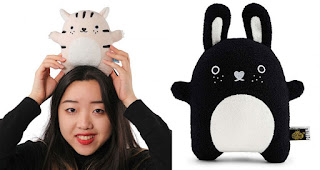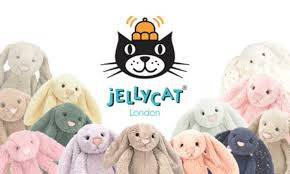This question comes up time and time again.
The simple answer is 'Of course they can be'.
The actual answer is a little more interesting.
From a safety point of view Jellycat announce that:
All of their toys are tested for any age suitability. This means that unless the toy carries a specific safety recommendation or suitability message, a Jellycat toy is safe for all ages - from birth to 100 years old (and beyond!).
The much more interesting question is:
'Is it normal for adults to have cuddly toys?'
So here you open up a debate about taste, psychology and mental health.
From a taste perspective there is, as they say, 'no accounting for taste', it is a completely personal thing, and so it should be, what an awful world it would be if we all liked the same things!
Some people will prefer the Jellycat Bashful Bunnies to the Jellycat Amuseables and vice versa and it is impossible to argue against personal preference.
From a psychological point of view as toynk.com observes:
'Yes, it's perfectly normal for adults to be emotionally attached to stuffed animals, especially if they were used as transitional objects during their childhood. As transitional objects, they provided safety and comfort, which could improve the well-being of your psychological state as an adult'.
Lots of adults still sleep with their beloved soft toys, and as the nytimes.com quotes:
Though there is no robust scientific literature on the effect of stuffed animals on adult sleep, several studies have shown that plush companions can help adults self-soothe.
A 2016 study observed that holding a stuffed animal during group therapy allowed college students to better comfort themselves.
Psychology obviously tips into the very sensitive subject of mental health.
Observations from recent studies, seem to show that childhood soft toys and even more recently acquired plushies can have a really positive effect.
According to Margaret Van Ackeren, a licensed therapist based in Anaheim, California 'In most instances, adults sleep with childhood stuffed animals because it brings them a sense of security and reduces negative feelings, such as loneliness and anxiety.'
According to news24.com '..when we cuddle anything soft and comforting, like a teddy bear, it releases oxytocin. This is a hormone that leaves us feeling calm and soothed. We're hardwired to be more drawn toward soft and cuddly things, and this applies to both kids and adults'.
So, not wanting to overplay the role of soft toys in mental health issues, it is apparanent that for some people and in certain situations, soft toys can be of some help, and anything that helps, in any way, has got to be a good thing.
So in answer to the original question, Jellycat soft toys are definitely for adults, as well as the myriad of babies, toddlers and children that love and adore them.
From just looking cute, to simply comforting, to actually helping in times of great stress, thank goodness for the wonderful world of soft toys!
Our website carries a wonderful assortment of soft toys including Jellycat, Moulin Roty, Noodoll, Moomin and Santoro Gorjuss and it can be accessed here:
Fleurtations
If you would like to visit us personally, and actually see our huge range of soft toys and accessories, simply put our address into 'maps'.
301-303 Westdale Lane, Mapperley, Nottingham, NG3 6EW
Fleurtations is centrally placed in the country, we have already had people drive to us from Fife, Glasgow, Manchester, Birmingham, Cardiff and London, so if you want to pay us a visit we will be open:
Mon - Fri 8:30 - 17:00
Saturday 8:30 - 13:00
Our lovely, helpful members of staff would love to see you!
The simple answer is 'Of course they can be'.
The actual answer is a little more interesting.
From a safety point of view Jellycat announce that:
All of their toys are tested for any age suitability. This means that unless the toy carries a specific safety recommendation or suitability message, a Jellycat toy is safe for all ages - from birth to 100 years old (and beyond!).
The much more interesting question is:
'Is it normal for adults to have cuddly toys?'
So here you open up a debate about taste, psychology and mental health.
From a taste perspective there is, as they say, 'no accounting for taste', it is a completely personal thing, and so it should be, what an awful world it would be if we all liked the same things!
Some people will prefer the Jellycat Bashful Bunnies to the Jellycat Amuseables and vice versa and it is impossible to argue against personal preference.
From a psychological point of view as toynk.com observes:
'Yes, it's perfectly normal for adults to be emotionally attached to stuffed animals, especially if they were used as transitional objects during their childhood. As transitional objects, they provided safety and comfort, which could improve the well-being of your psychological state as an adult'.
Lots of adults still sleep with their beloved soft toys, and as the nytimes.com quotes:
Though there is no robust scientific literature on the effect of stuffed animals on adult sleep, several studies have shown that plush companions can help adults self-soothe.
A 2016 study observed that holding a stuffed animal during group therapy allowed college students to better comfort themselves.
Psychology obviously tips into the very sensitive subject of mental health.
Observations from recent studies, seem to show that childhood soft toys and even more recently acquired plushies can have a really positive effect.
According to Margaret Van Ackeren, a licensed therapist based in Anaheim, California 'In most instances, adults sleep with childhood stuffed animals because it brings them a sense of security and reduces negative feelings, such as loneliness and anxiety.'
According to news24.com '..when we cuddle anything soft and comforting, like a teddy bear, it releases oxytocin. This is a hormone that leaves us feeling calm and soothed. We're hardwired to be more drawn toward soft and cuddly things, and this applies to both kids and adults'.
So, not wanting to overplay the role of soft toys in mental health issues, it is apparanent that for some people and in certain situations, soft toys can be of some help, and anything that helps, in any way, has got to be a good thing.
So in answer to the original question, Jellycat soft toys are definitely for adults, as well as the myriad of babies, toddlers and children that love and adore them.
From just looking cute, to simply comforting, to actually helping in times of great stress, thank goodness for the wonderful world of soft toys!
Our website carries a wonderful assortment of soft toys including Jellycat, Moulin Roty, Noodoll, Moomin and Santoro Gorjuss and it can be accessed here:
Fleurtations
If you would like to visit us personally, and actually see our huge range of soft toys and accessories, simply put our address into 'maps'.
301-303 Westdale Lane, Mapperley, Nottingham, NG3 6EW
Fleurtations is centrally placed in the country, we have already had people drive to us from Fife, Glasgow, Manchester, Birmingham, Cardiff and London, so if you want to pay us a visit we will be open:
Mon - Fri 8:30 - 17:00
Saturday 8:30 - 13:00
Our lovely, helpful members of staff would love to see you!
Here are a few soft toy links from our site that you might like:
To view our entire Moomin collection, check out our Moomin Homepage
To view our entire Moulin Roty collection, check out our Moulin Roty Homepage
Are you a Jellycat fan? Check out our Jellycat Homepage to view the entire Jellycat catalogue
Noodoll, the London based soft toy design company can be found here Noodoll
Our Social Media pages are listed below!
We are constantly posting about new products and sales. You may find something interesting!




Comments
Post a Comment